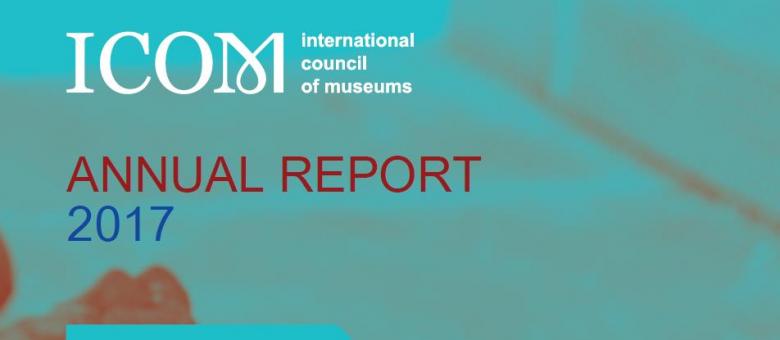
News

ICOM Annual Report 2017
by
Suay Aksoy, ICOM President
Peter Keller, ICOM Director General
As institutions in the service of society, museums have enormous potential to facilitate social cohesion and engage in the debate on human rights and social equality.
In the aftermath of ICOM’s 70th anniversary celebrations in 2016, 2017 was also a year of commemorations for many of the organisation’s National and International committees,
several of whom celebrated significant anniversaries. These landmarks are a reminder of what our organisation has achieved over the past 71 years. The consistent and fruitful collaboration of our 40,860 members-strong network in 2017 is a testament to the continued passion, dedication and creativity of our international community of museum professionals and experts.
This collaboration was visible in 2017 in the number of joint events held between committees. International Committees cooperated with the National Committees in the host countries of their events, ensuring accurate scrutiny of museum development and challenges in those regions. International Committees also joined forces, in some cases including Regional Alliances and Affiliated Organisations in their discussions, to ensure not only added regional expertise, but also vital interdisciplinary exchange. This solidarity between ICOM’s committees was also in evidence when natural disaster struck in the host countries of their respective events. Logistical support was provided, with some committees raising funds to assist museum professionals affected, such as ICEE in Puerto Rico. ICOM’s DRMC was also active in monitoring situations and mobilising resources. Meanwhile, new National Committees were created and others renewed. The newly created standing committee on Museum Definition Prospects and Potentials gained impressive momentum as roundtables were held worldwide to gather perspectives and take stock of the diverse regional realities within the museum field.
In 2017, ICOM stepped up its role as an advocate for museums on the international stage by participating in its first G7 Ministerial Meeting on Culture in Florence, Italy. The declaration which followed, emphasising the risk to cultural heritage from crime and natural disasters, highlighted the need for international cooperation in protecting cultural property and gave an added impetus to ICOM’s actions in this area. Our organisation continued to be relentless in the fight against illicit traffic in cultural goods by preparing Red Lists for Yemen and South-East Europe and reinforcing cooperation with law enforcement agencies such as INTERPOL, the World Customs Organization and other experts.
As institutions in the service of society, museums have enormous potential to facilitate social cohesion and engage in the debate on human rights and social equality. In a dramatically altered museum landscape, and a world still rife with conflict, it is vital that museums reinforce their social role. The theme of International Museum Day in 2017—Museums and Contested Histories—prompted a welcome debate on society’s ability to deal with difficult history. The theme generated unprecedented participation by museums and museum professionals as they considered how a greater understanding of a painful, collective past might lead to a more harmonious and shared future. The theme also inspired several committees to organise joint conferences on the topic, leading to publications under preparation, including an issue of Museum International to appear in 2018.
Migration was another hotly debated topic among our community in 2017. Protecting the free movement of museum professionals in a highly charged political context was addressed by ICOM US in a statement released following an Executive Order restricting entry to certain citizens released by the Trump administration. As a platform for knowledge transfer and expertise, ICOM continued to prioritise research and professional development in 2017. Its International Training Centre (ICOM-ITC) organised two workshops at the Palace Museum in Beijing, China, and a new monograph series— ICOM Advances in Museum Research—was launched in October. The first book, The Future of Natural History Museums, is set to resonate with a wider museum public, and plans for the next book in the series are underway.
In a year rich with collaboration, advocacy and engagement, ICOM has done much to provoke dialogue and incite action on the issues our collective society faces today. Let us build on this solidarity that characterises our organisation and continue to work relentlessly to ensure that museums’ voices are heard and their potential to promote social cohesion in our world realised.
DOWNLOAD-LINK:
http://icom.museum/fileadmin/user_upload/pdf/Activity_report/2055_ICO-RA...





